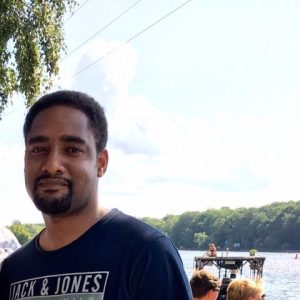Afropean Voices during Covid-19: Deepening connections, around the corner and across the ocean
 Lucas Oló Fernandes is a human rights lawyer who has worked on anti-corruption in organizations such as Dow Jones and Transparency International, and has co-founded various initiatives in these topics. Since 2020, he manages APROFORT, a program that provides support, protection and capacity building to civil society activists and organisations working in the promotion of human rights and good governance in Equatorial Guinea.
Lucas Oló Fernandes is a human rights lawyer who has worked on anti-corruption in organizations such as Dow Jones and Transparency International, and has co-founded various initiatives in these topics. Since 2020, he manages APROFORT, a program that provides support, protection and capacity building to civil society activists and organisations working in the promotion of human rights and good governance in Equatorial Guinea.
At the beginning of the COVID-19 pandemic, work was slow. We, like many around us, were adapting to the pandemic while coping with its widespread human and social impact. However, after a slow start, work started to pick up. Various opportunities spurred and we had the right skills at the right time. I had worked from home or remotely in the past, so I was experienced with the set up, and knew which challenges I could encounter and how to overcome them. I had the infrastructure of networks and processes to hit the floor running. For instance, having more than one contact telephone number for key contact in a difficult country, as well as contacts for people in the same city or neighbourhood who could reach this contact within hours.
Digitalisation has improved our access and our engagement across the world, even to the most remote areas. Because of COVID-19 we are all adapting and deepening our understanding of the opportunities that we can create for our personal and professional relationships through the digital space. But not everyone, especially my counterparts in African countries, were fully engaged digitally or using e-mails, virtual conferencing applications, for professional global interactions, as often as it was necessary. They could always call and preferred to do so, which was costly and thus sporadic. Some could also even travel which would take time and the loss of much needed momentum in an important case.
With the global restrictions on mobility associated with COVID-19, a professional that has and needs to work, has to be connected. Thus, from Portugal, where I live, I provide regular legal support to lawyers in Malabo, Equatorial Guinea. This, before the pandemic, it used to be difficult. Lawyers did not invest in the infrastructure necessary to get support remotely, even when you offered support to help them set it up; if you were not physically there, you were not there or just a last minute resource, when you could have helped from the beginning.
Nowadays, these same lawyers have their ICTs set and are e-mailing and videoconferencing regularly which makes our work significantly different, more impactful. We have received more requests for support than we expected and can manage, and we are now expanding to Bata, the main city in the mainland area of the country. We, for instance, support victims of state and police brutality in enforcing the restrictions associated with the pandemic, health professionals that dare to talk about the real situation of the national COVID-19 response, or members of the LGTBI just trying to be themselves. As through social media and digital devices, the narratives are difficult to control, just by sending information about those who have died, people are becoming more aware of the need to understand their context and look for solutions.
Curiously, my strengthened outreach to Africans across the ocean is not corresponded by a similar outreach to Afro-descendant communities in Portugal, or to my understanding of their circumstances, which like our African counterparts have to do with access to opportunities and our ability to realise them.
I believe that my work helps people find hope, mostly in situations in which they have given up. And I wish, through digitalisation, to be able to engage more people in the diaspora, such as the support of Afro-descendant communities in Europe to contribute too.
This perspective is included in the upcoming Collateral Benefits Perspective Paper IV: Voices of the African Diaspora, a collaboration between Collateral Benefits , Fundación Manos Visibles and Afrøpean.


